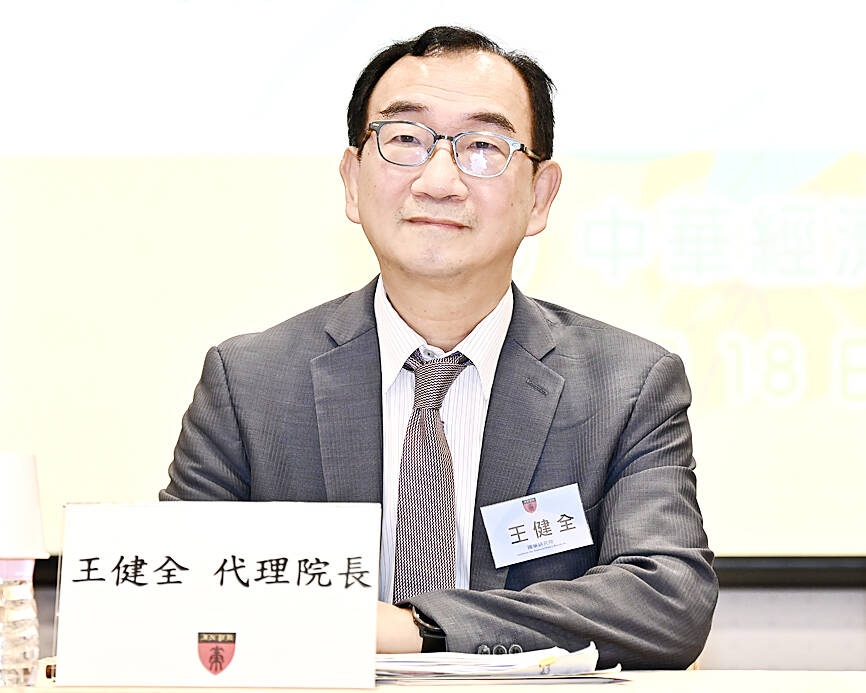The Chung-Hua Institution for Economic Research (CIER, 中華經濟研究院) yesterday revised up its forecast for Taiwan’s GDP growth this year from 3.38 percent to 3.81 percent on stronger-than-expected exports, propelled by growing global demand for artificial intelligence (AI) applications.
Exports, which account for 60 percent of the nation’s GDP, are gathering momentum after expanding 12.89 percent and 9.9 percent in the first and second quarters this year, thanks to aggressive spending by US technology giants on AI infrastructure and solutions, CIER acting president Wang Jiann-chyuan (王健全) said.
“The economic pickup is clear and evident, judging by healthy data on exports, export orders and purchasing managers’ index,” the economist said, adding that all indicators have climbed to expansion territory.

Photo: Tu Chien-rong, Taipei Times
The landscape looks brighter for the rest of this year with the high sales season for technology products arriving and inventory adjustments running to an end, Wang said.
Smartphone and notebook computer brands usually launch their newest-generation gadgets in September to spur replacement demand, thus ramping up business for Taiwanese firms in their supply chains.
Exports are expected to grow 5.24 percent this quarter and 6.05 percent next quarter, slowing on a year-on-year basis as the low base effect tapers off, the economist said.
“The recovery in exports would be more solid if regular orders far outnumber short and rush orders as well as extend to more sectors,” Wang said.
Non-technology sectors are bottoming out, but greater market demand is desired as competition from abroad sharpens, he said.
The overall pattern of recovery is relatively balanced, with support from external and domestic demand,” Wang said.
Private consumption would increase 2.95 percent this year, on top of the rapid 8.19 percent growth in private consumption last year, CIER said, adding that stock rallies at home and abroad would help boost private finances and encourage spending.
Private investment, a drag on growth last year with an 11.21 percent decline, might register a 0.43 percent rebound, as firms’ interest in capital equipment acquisition and capacity expansions increases, it said.
The Taipei-based think tank is looking at 2.16 percent inflation, which would still remain above the central bank’s 2 percent target, while mitigating from 2.49 percent last year.
Wang said the US Federal Reserve is likely to cut interest rates in September and beyond, as US GDP growth and labor market conditions show signs of softening.
This would be favorable for the New Taiwan dollar, which shed another NT$0.125 yesterday to the lowest level since May 2016, according to the central bank’s data.
The retreat had to do with keen capital outflows after former US president and Republic Party presidential candidate Donald Trump voiced plans to raise tariffs on Taiwanese goods if elected in November, Wang said.
Likewise, the TAIEX lost 4.38 percent this week, as investors dumped tech shares.
Wang said Taiwan is a global technology leader because US firms prefer to focus on high-margin fab designs and outsource low-margin fab manufacturing businesses.
It is better to take a wait-and-see approach on whether Trump means what he says on the campaign trail, the economist said.

AI BOOST: Although Taiwan’s reliance on Chinese rare earth elements is limited, it could face indirect impacts from supply issues and price volatility, an economist said DBS Bank Ltd (星展銀行) has sharply raised its forecast for Taiwan’s economic growth this year to 5.6 percent, citing stronger-than-expected exports and investment linked to artificial intelligence (AI), as it said that the current momentum could peak soon. The acceleration of the global AI race has fueled a surge in Taiwan’s AI-related capital spending and exports of information and communications technology (ICT) products, which have been key drivers of growth this year. “We have revised our GDP forecast for Taiwan upward to 5.6 percent from 4 percent, an upgrade that mainly reflects stronger-than-expected AI-related exports and investment in the third

Mercuries Life Insurance Co (三商美邦人壽) shares surged to a seven-month high this week after local media reported that E.Sun Financial Holding Co (玉山金控) had outbid CTBC Financial Holding Co (中信金控) in the financially strained insurer’s ongoing sale process. Shares of the mid-sized life insurer climbed 5.8 percent this week to NT$6.72, extending a nearly 18 percent rally over the past month, as investors bet on the likelihood of an impending takeover. The final round of bidding closed on Thursday, marking a critical step in the 32-year-old insurer’s search for a buyer after years of struggling to meet capital adequacy requirements. Local media reports

TECHNOLOGICAL RIVALRY: The artificial intelligence chip competition among multiple players would likely intensify over the next two years, a Quanta official said Quanta Computer Inc (廣達), which makes servers and laptops on a contract basis, yesterday said its shipments of artificial intelligence (AI) servers powered by Nvidia Corp’s GB300 chips have increased steadily since last month, should surpass those of the GB200 models this quarter. The production of GB300 servers has gone much more smoothly than that of the GB200, with shipments projected to increase sharply next month, Quanta executive vice president Mike Yang (楊麒令) said on the sidelines of a technology forum in Taipei. While orders for GB200 servers gradually decrease, the production transition between the two server models has been

ASE Technology Holding Co (日月光投控), the world’s largest integrated circuit (IC) packaging and testing supplier, yesterday announced a strategic collaboration with Analog Devices Inc (ADI), coupled with the signing of a binding memorandum of understanding. Under the agreement, ASE intends to purchase 100 percent shares of Analog Devices Sdn Bhd and acquire its manufacturing facility in Penang, Malaysia, a press release showed. The ADI Penang facility is located in the prime industrial hub of Bayan Lepas, with an area of over 680,000 square feet, it said. In addition, the two sides intend to enter into a long-term supply agreement for ASE to